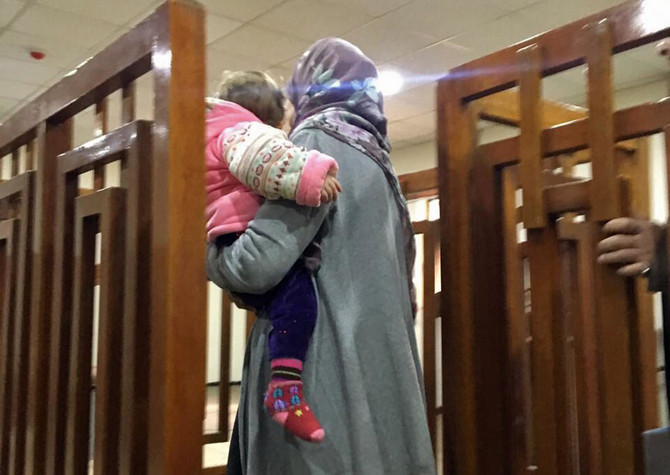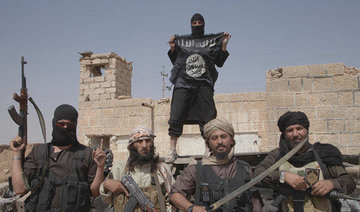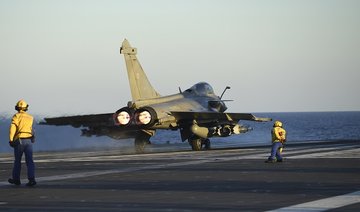ANKARA/BAGHDAD: Turkey has increased diplomatic efforts to release citizens held in Iraq after 16 Turkish women linked to Daesh were sentenced to death.
Iraq is holding a series of trials of foreign fighters linked to Daesh, including women who joined the group after it launched a devastating takeover of the north of the country in 2014. About 300 Turkish women affiliated with Daesh are held in Iraqi prisons, AFP reported.
Ankara says that the detentions have no legal basis. Officials have requested the return of children and adults who have not committed any crimes, the Turkish newspaper Daily Sabah reported on Tuesday. Ankara is in contact with Iraqi authorities for their safe release, the officials said, adding that four children have returned to Turkey.
Reports say that the women, of various nationalities, currently on trial in Iraq are wives or widows of Daesh members or implicated in attacks by the group by providing its members with logistics assistance.
In court in Baghdad on Sunday, the women were sentenced to death by hanging. Four of the women were accompanied by young children. A judicial official told AFP they had all confessed to the charges and admitted entering Iraq illegally to join their Daesh militant husbands.
A source at the Iraqi Supreme Judiciary Council told Arab News that the women have the right to appeal before the federal court.
“These women have confessed that they committed terrorist crimes on Iraqi soil and were tried according to Iraqi laws,” the source said. “No Iraqi or non-Iraqi authority has the right to interfere in the work of the judiciary.”
Jamal Assadi, a senior government legal adviser, told Arab News that every state has full freedom to try any foreigner who commits an offense on its territory. “Iraq is no exception to this principle,” he said.
He said many Iraqis were tried and sentenced in Turkey and Iraq “had not expressed any objection.”
The number of Daesh fighters’ relatives held in Iraq has flooded the country’s legal system. More than 1,300 women and children surrendered to the Iraqi authorities in August alone after Daesh was forced into retreat.
The speed of the trials and death sentences in a country still raw from the suffering brought by the extremists has raised concerns from human rights groups. Iraq has one of the highest execution rates in the world.
Last month, a German woman of Moroccan origin was also sentenced to death for being a member of Daesh.
Human Rights Watch denounced the rulings as “unfair.”
However, Iraq also extradited to Russia four women and 27 children allegedly linked to the group, claiming that they were “trapped” into joining it.
The sentencing of Turks risks upsetting a delicate, but improving, relationship between Ankara and Baghdad.
Last month, Turkish Prime Minister Binali Yildirim and his Iraqi counterpart Haider Al-Abadi agreed to increase their cooperation against Daesh.
On Feb. 17, Turkish authorities extradited a top Daesh leader to Iraq after he had fled to Turkey’s northwestern province of Sakarya. Authorities said his capture was the result of intense cooperation between Baghdad, Washington and Ankara.
Turkey recently pledged $5 billion (SR18.75 billion) to help reconstruction efforts in Iraq after the devastation of Daesh.
“In light of the recent positive developments between Iraq and Turkey, it is unlikely that this case would develop into a diplomatic crisis,” Dr. Muhanad Seloom, associate lecturer in international relations at the University of Exeter, told Arab News.
“Cross-border criminal cases are inherently complex because of states’ sovereign powers, types of legal systems, and different governance systems,” he added.
In order to secure the release and extradition of its citizens, Seloom said the Turkish government should provide legal representation to its citizens incarcerated in Iraq and initiate talks with the Iraqi government.
Daesh widows pile pressure on Iraqi justice system
Daesh widows pile pressure on Iraqi justice system

Tens of thousands of Palestinians flee West Bank refugee camps

- The camps, built for descendants of Palestinian refugees who fled or were driven from their homes in the 1948 war around the creation of the state of Israel, have long been major centers for armed militant groups
JERUSALEM: Tens of thousands of Palestinians living in refugee camps in the occupied West Bank have left their homes as a weeks-long Israeli offensive has demolished houses and torn up vital infrastructure in the heavily built up townships, Palestinian authorities said.
Israeli forces began their operation in the refugee camp in the northern West Bank city of Jenin on Jan. 21, deploying hundreds of troops and bulldozers that demolished houses and dug up roads, driving almost all of the camp’s residents out.
“We don’t know what’s going on in the camp but there is continuous demolition and roads being dug up,” said Mohammed Al-Sabbagh, head of the Jenin camp services committee.

The operation, which Israel says is aimed at thwarting Iranian-backed militant groups in the West Bank, has since been extended to other camps, notably the Tulkarm refugee camp and the nearby Nur Shams camp, both of which have also been devastated. The camps, built for descendants of Palestinian refugees who fled or were driven from their homes in the 1948 war around the creation of the state of Israel, have long been major centers for armed militant groups. They have been raided repeatedly by the Israeli military but the current operation, which began as a ceasefire was agreed in Gaza, has been on an unusually large scale. According to figures from the Palestinian Authority, around 17,000 people have now left Jenin refugee camp, leaving the site almost completely deserted, while in Nur Shams 6,000 people, or about two thirds of the total, have left, with another 10,000 leaving from Tulkarm camp.
“The ones who are left are trapped,” said Nihad Al-Shawish, head of the Nur Shams camp services committee. “The Civil Defense, the Red Crescent and the Palestinian security forces brought them some food yesterday but the army is still bulldozing and destroying the camp.” The Israeli raids have demolished dozens of houses and torn up large stretches of roadway as well as cutting off water and power, but the military has denied forcing residents to leave their homes.
“People obviously have the possibility to move or go where they want, if they will. But if they don’t, they’re allowed to stay,” Lt. Col. Nadav Shoshani told reporters.
The operation began as Israel moved to banish the main UN Palestinian relief organization UNRWA from its headquarters in East Jerusalem and cut it off from any contact with Israeli officials.
The ban, which took effect at the end of January, has hit UNRWA’s work in the West Bank and Gaza, where it provides aid for millions of Palestinians in the refugee camps.
Israel has accused UNRWA of cooperating with Hamas and said some UNRWA workers even took part in the Hamas-led attack on communities in southern Israel on Oct. 7, 2023 that set off the 15-month war in Gaza.
More than one million Syrians return to their homes: UN

- “Since the fall of the regime in Syria we estimate that 280,000 Syrian refugees and more than 800,000 people displaced inside the country have returned to their homes,” Filippo Grandi, the UN High Commissioner for Refugees
GENEVA: More than one million people have returned to their homes in Syria after the overthrow of Bashar Assad, including 280,000 refugees who came back from abroad, the UN said on Tuesday.
Assad was toppled in December in a rebel offensive, putting an end to his family’s decades-long grip on power in the Middle Eastern country and bookmarking a civil war that broke out in 2011, with the brutal repression of anti-government protests.
Syria’s war has killed more than half a million people and displaced millions from their homes.
The Islamist-led rebels whose offensive ousted Assad have sought to assure the international community that they have broken with their past and will respect the rights of minorities.
“Since the fall of the regime in Syria we estimate that 280,000 Syrian refugees and more than 800,000 people displaced inside the country have returned to their homes,” Filippo Grandi, the UN High Commissioner for Refugees, wrote on the X social media platform.
“Early recovery efforts must be bolder and faster, though, otherwise people will leave again: this is now urgent!” he said.
At a meeting in Paris in mid-February, some 20 countries, including Arab nations, Turkiye, Britain, France, Germany, Canada and Japan agreed at the close of a conference in Paris to “work together to ensure the success of the transition in a process led by Syria.”
The meeting’s final statement also pledged support for Syria’s new authorities in the fight against “all forms of terrorism and extremism.”
Algiers slams French minister’s visit to W. Sahara

- France’s stance on Western Sahara has been ambiguous in recent years, often straining its ties with Morocco
ALGIERS: Algeria on Tuesday denounced a visit by French Culture Minister Rachida Dati to Western Sahara, after Paris recognized Moroccan sovereignty over the disputed territory, as “objectionable on multiple levels.”
The vast desert territory is a former Spanish colony largely controlled by Morocco but claimed for decades by the Algeria-backed Polisario Front.
Dati, who described her visit as “historic,” launched with Moroccan Culture Minister Mohamed Mehdi Bensaid a French cultural mission in the territory’s main city, Laayoune.
An Algerian foreign ministry statement posted on social media Tuesday said the visit “reflects blatant disregard for international legality by a permanent member of the UN Security Council.”
“This visit reinforces Morocco’s fait accompli in Western Sahara, a territory where the decolonization process remains incomplete and the right to self-determination unfulfilled,” it said.
Dati’s trip, a first for a French official, “reflects the detestable image of a former colonial power in solidarity with a new one,” the statement added.
The United Nations considers Western Sahara to be a “non-self-governing territory” and has had a peacekeeping mission there since 1991, whose stated aim is to organize a referendum on the territory’s future.
But Rabat has repeatedly rejected any vote in which independence is an option, instead proposing autonomy under Morocco.
France’s stance on Western Sahara has been ambiguous in recent years, often straining its ties with Morocco.
But in July, French President Emmanuel Macron said Rabat’s autonomy plan was the “only basis” to resolve the Western Sahara dispute.
Algeria has backed the separatist Polisario Front and cut diplomatic relations with Rabat in 2021 — the year after Morocco normalized ties with Israel under a deal that awarded it US recognition of its annexation of the Western Sahara.
In October, the UN Security Council called for parties to “resume negotiations” to reach a “lasting and mutually acceptable solution” to the Western Sahara dispute.
In November 2020, the Polisario Front said it was ending a 29-year ceasefire with Morocco after Moroccan troops were deployed to the far south of the territory to remove independence supporters blocking the only road to Mauritania.
The Polisario Front claims the route is illegal, arguing that it did not exist when the ceasefire was established in 1991.
Kurdistan region’s pipeline restart ready to go, foreign minister says

- Baghdad has periodically withheld the Kurdistan region’s share of the federal budget to try to stop it from exporting oil independently
BAGHDAD: A major pipeline connecting Iraq’s semi-autonomous Kurdistan region to Turkiye is ready to reopen and resume exports, the Kurdish foreign minister said on Tuesday, potentially ending a dispute between Baghdad and Irbil that led to the closure of the pipeline in 2023.
Foreign Minister Safeen Dizayee declined to say when the pipeline would reopen but said it would mark a turning point in relations between Kurdistan and Baghdad.
Iraq’s oil minister said on Monday the Iraq-Turkiye pipeline (ITP) will resume next week.
“All arrangements that were set on the table have been agreed to, with the aim to prepare for re-exports. There shouldn’t be any hiccups. The legal aspects have been met, the technical aspects are in place,” Dizayee told Reuters by phone. “The button just has to be pushed to increase production and then re-export.”
The oil flows were halted by Turkiye in March 2023 after the International Chamber of Commerce ordered Ankara to pay Baghdad damages of $1.5 billion for unauthorized pipeline exports by the Kurdistan Regional Government between 2014 and 2018.
Negotiations to restart the pipeline have been ongoing, with US officials participating in some of the talks.
Resuming oil exports will boost the Kurdistan region’s budget, Dizayee said.
“This means Kurdistan will benefit from the federal budget and hopefully this will end the saga of (civil servants’) salaries coming or not coming, received in dribs and drabs,” Dizayee said.
Baghdad has periodically withheld the Kurdistan region’s share of the federal budget to try to stop it from exporting oil independently.
Oil producers in the Kurdistan region have had to wind down production without an export route. It will likely take some time for them to restart their oil wells and for the pipeline to use its full capacity. Before it was shut down, it transported around 450,000 barrels per day.
“They’ve invested a lot. It was a risk they took and it must pay off. They [the companies] need assurances that their investment will not be down the drain,” Dizayee said. “Compensation is something that needs to be discussed.”
An international consultancy will be brought in to do an assessment of the cost of production, expenses, cost recovery and the production sharing agreements, he said.






















